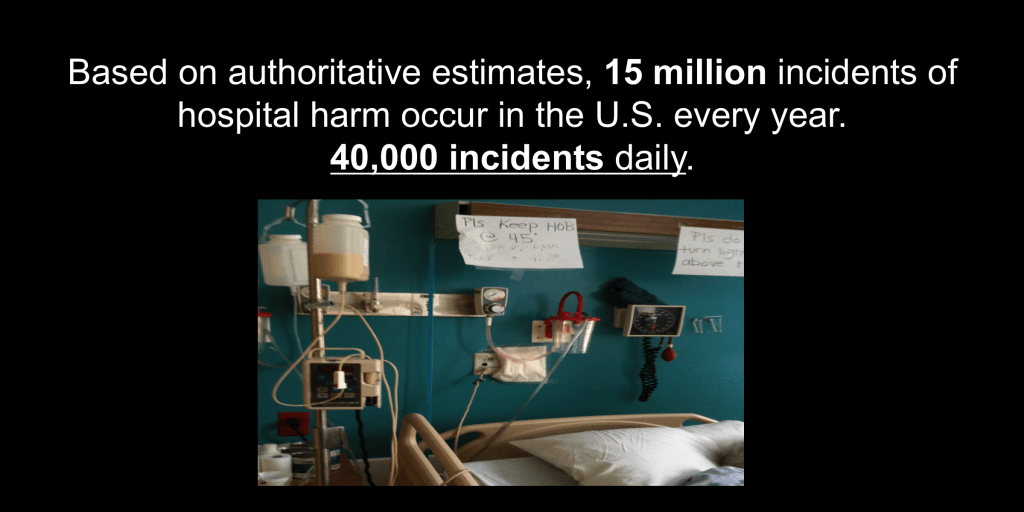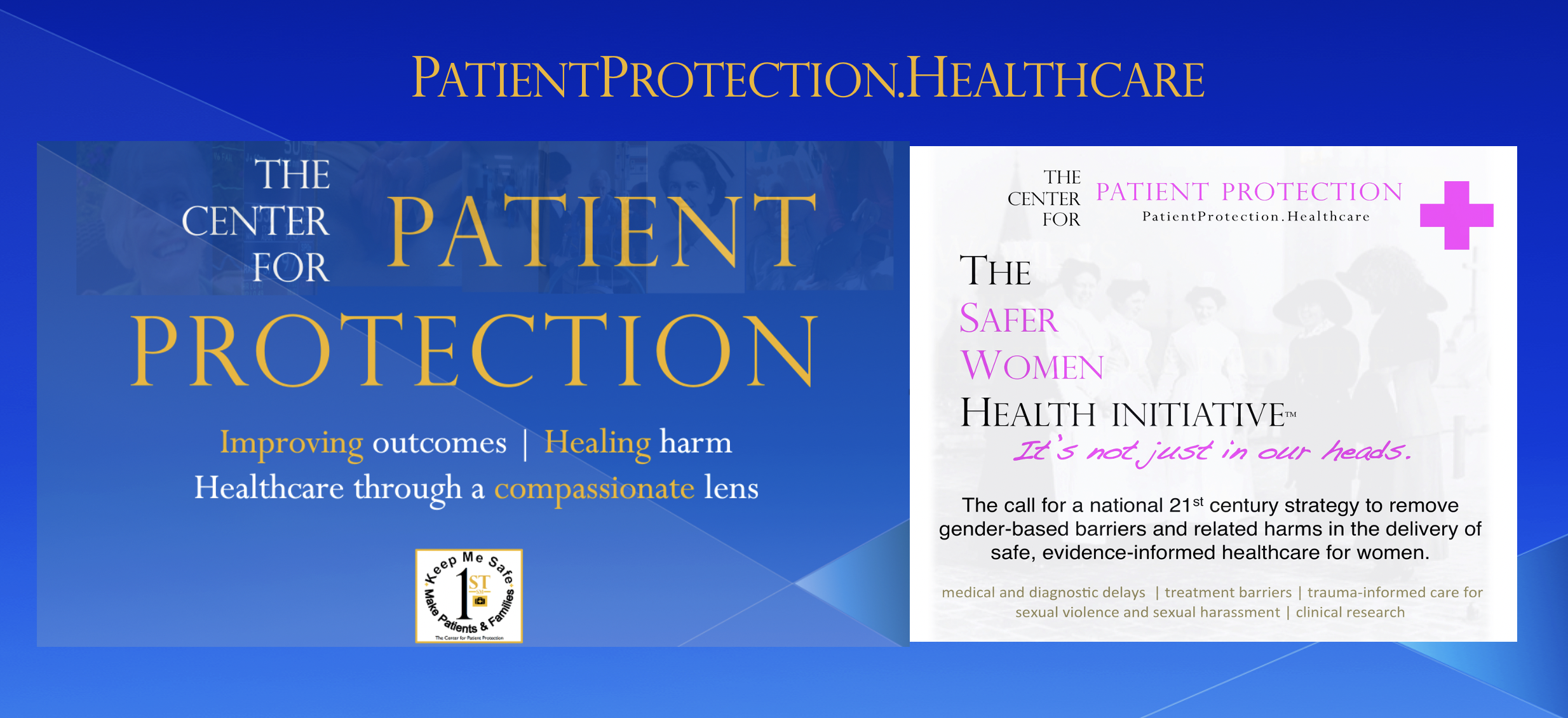Published in The Huffington Post, November 1, 2013
The silent killer that stalks hospitals everywhere
 There is a medical emergency rolling across the land and into its hospital rooms. No drug is available to cure it, and it can be as lethal as any superbug. It is the epidemic of hospital medical errors that is literally killing thousands of patients each year and leaving others injured or at unnecessary risk. Some experts are already calling it a healthcare emergency.
There is a medical emergency rolling across the land and into its hospital rooms. No drug is available to cure it, and it can be as lethal as any superbug. It is the epidemic of hospital medical errors that is literally killing thousands of patients each year and leaving others injured or at unnecessary risk. Some experts are already calling it a healthcare emergency.
In the United States, it is estimated that as many as 400,000 patients die from these errors every year. They range from medication foul-ups to infections that are not properly controlled. Lisa McGiffert, manager of Consumers Union’s Safe Patient Project, is not exaggerating when she says, “Given the number of lives at stake, the U.S. should be treating patient safety as a national emergency and mounting a much more aggressive campaign to end medical harm.”
What about Canada? We are far from immune from this epidemic. One study claims that more people die from medical errors in Canada than from breast cancer, motor vehicle accidents and HIV-AIDS combined. It is the third leading cause of death in this country, as it is in the United States.
Medication errors are a large part of the overall problem. And they are widespread in the hospital setting. Most never get reported. My mother was subjected to serious medication errors during three different hospitalizations. One involved an allergic reaction to a steroid given in a massive dose when the doctor would not listen to the family’s warnings. That resulted in a four-week hospital admission. Three years later, she developed the hideous and often deadly infection known as C. difficile as a result of a combination of drugs that never should have been prescribed together. Two years after that, she was subjected to a shocking number of medication errors, ranging from drugs given by the wrong route, extra doses and missed doses, to drugs that were improperly prepared, administered and monitored. And she was just one patient.
Another, and very well-documented, hospital nightmare for a still-grieving family seeking answers in the tragic loss of their mother is set out here. Like many families whose loved ones have been betrayed by a hospital, they are seeking to change what is too often an unaccountable healthcare system.
There are numerous reasons that have been put forth as to why there continue to be so many medical errors. Some almost approach the-dog-ate-my-homework level, ranging from bad handwriting by doctors to bad hand hygiene by clinical staff. Obviously, they didn’t have the benefit growing up as I did of a fastidious mother on both counts. Another common excuse is that so many errors don’t get reported because doctors and nurses fear the repercussions if they are disclosed. Since it is almost impossible in Canada, at least, for an ordinary family to successfully sue doctors or nurses, given the taxpayer financed legal arsenal hospitals and insurance companies have at their disposal, these so-called repercussions clearly aren’t the kind that hit the pocketbooks of healthcare providers.
Many experts suggest what is needed is a blame-free hospital culture that won’t point the finger at any culprit. They say this will encourage better error reporting. But will it prevent the errors from occurring? What would happen if our traffic laws had no consequences for people who could just claim they made an honest mistake when they were speeding or went through a red light? Just admit the wrong and move on? Where else in society does it work that way?
In fact, perhaps what is required is not a no-fault culture, but one where it actually becomes unlawful not to report medical errors. Certainly — and you have not seen this idea advanced anywhere else, nor are you likely to — the Criminal Code of Canada should be amended to make it a crime for a hospital to intentionally destroy records or otherwise attempt to conceal and cover-up the facts related to medical errors and harm. That might make clinicians and hospital administrators think twice before they engage in a practice that, at least in terms of the perceptions voiced by many families, occurs all too frequently.
It did on a shocking scale in the case of my mother as well. The laws should also be changed so that each province requires hospitals to report in detail on all the errors that occur and gives the public access to that information. Right now, only Quebec and Saskatchewan make such wide-ranging provisions mandatory.
Think about all that you have read on breast cancer research and efforts to reduce motor vehicle accidents. Now, compare that to how much you know and have read about the campaign to reduce hospital medical errors, which claim more lives each year than these other two high-profile causes combined. In light of this, it is puzzling that the media have not gravitated to this issue by reporting on it in any significant way and give it even less ink in investigating its causes. Clearly, the protection of the public requires that medical errors be treated as the national healthcare epidemic they are. Just ask any patient or family who has suffered harm. Nothing less is acceptable.
[Update on the removal of life support by doctors and related DNR issue:]
This week, Britain’s highest court ruled in favour of a hospital that gained court approval to withhold treatment from a terminally ill man despite the family’s opposition. In coming to its decision, the court noted that doctors had estimated that the patient had a one percent chance of survival with the treatment.
When doctors sought a DNR order from me immediately after my mother’s hospitalization with a serious brain injury, they also said that anyone over 80 has a less than one per cent chance of surviving a cardiac arrest. Had I acted on that statistic, or if the law had allowed physicians to make the DNR order over my objections, I would not have heard these priceless words from my mother last night as she calmly drifted off to sleep: “I love you, dear.”

